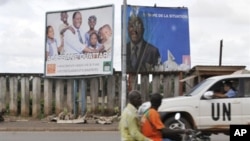Sunday's presidential vote in Ivory Coast is meant to reunite the country eight years after a brief civil war. Former rebels who still control areas in the north say they will keep most of their forces in barracks during the vote.
At first, it is subtle difference driving between the government-controlled south and northern areas still run by former fighters. The soldiers' uniforms do not quite match. There are more people with guns just hanging around; more checkpoints and more questions about what you are carrying.
Commercial trucks driving this main road north from Abidjan pay regular fees to pass in and out of rebel-held areas. The World Bank estimates the forces in control here earn at least $300 million a year from these checkpoints.
But it is not just the trucks. Cars too get closer inspection in the north. "What do you have for me?" a young rebel asks leaning in the window. "A soda? Water? Something else?"
The perceived ethnic inequalities that sparked the conflict in 2002 still exist in Ivory Coast. And they are not hard to find in the last week of campaigning.
Northern rebels started the war because they said southern politicians were neglecting the region. Former prime minister Alassane Ouattara was previously disqualified as a candidate because of questions about his nationality in a part of the country where many people are decedents of migrant workers from Mali and Burkina Faso.
Ouattara is a candidate in this vote and says he is running to reunite the country.
Ouattara says he has a message of peace in this election, which he says is especially important in areas that have known the difficulties of conflict. He says he has a solution for a population in crisis and hopes that this election allows him to put his program in action.
The question of Ivorian identity came to a head in February when President Laurent Gbagbo dissolved his government and dismissed the electoral commission saying that more than 400,000 people were illegally registered to vote.
President Gbagbo eventually agreed to a new voter list. But he has kept up the issue on the campaign trail, saying that of the major candidates in this election he is the only true Ivorian.
The president says there is one Ivorian in this race and three impostors. The others are foreign impostors, he says, and he does not want his country to be governed by foreigners.
Ivorian Voters in Rebel-Held Areas Prepare for Sunday's Election














